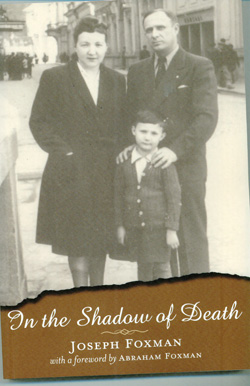In the Shadow of Death by Joseph Foxman, Yad Vashem and the Holocaust Survivors Memoirs Project, 2011, 198 pages including photos and reproduction of Yiddish manuscript, price unlisted.
By Donald H. Harrison

SAN DIEGO—Perhaps the principal value of this Holocaust memoir is that it documents how Abraham Foxman, the national director of the Anti-Defamation League, was saved as a toddler from likely death during the Holocaust by his parents’ former housekeeper. It also tells how his parents survived the Vilna ghetto, and later won several legal battles to reclaim Abraham from his rescuer, who in the interim had him baptized as a Roman Catholic and claimed him for her own.
In reading the memoir of Joseph Foxman – Abraham’s father –one gets the feeling that his manuscript was never intended for publication in its present form. Insightful characterization of the people who occupied his world is missing; for the most part, so are emotions. Rather, the manuscript felt as if Joseph had jotted down the sequence of events of his life during the Holocaust, perhaps with the idea of fleshing out the story later. However, Joseph never got around to writing his book before dying well into the post-war era. Sometime after his father’s death, Abraham found the manuscript among his father’s effects, and then had it translated, extensively footnoted, and published.
 In printed form, Joseph Foxman’s episodic memories of various occasions that could have resulted in the Nazis murdering him occupy only 45 type-set pages of this book. The balance of the volume is a photocopy of Joseph’s original handwritten Yiddish manuscript along with some family photos. This is not a literary work, so much as an aggregation of the Foxman family’s experiences.
In printed form, Joseph Foxman’s episodic memories of various occasions that could have resulted in the Nazis murdering him occupy only 45 type-set pages of this book. The balance of the volume is a photocopy of Joseph’s original handwritten Yiddish manuscript along with some family photos. This is not a literary work, so much as an aggregation of the Foxman family’s experiences.
While the narrow escapes that Joseph had from the Nazi killing machine were remarkable, by and large they appeared to be matters of chance, for which Joseph claims no particular responsibility or ingenuity. A typical example, one day he was prevented from getting on a truck leaving the ghetto; the people who did get go on that truck were arrested and presumably murdered by the Nazis. One might be tempted to say that God intervened to keep Joseph out of the Nazi death clutch, but, if so, one also would have to assign responsibility to God for those whom the Nazis slaughtered.
True, Joseph prayed his thanks after each such “escape,” but he did not make any claim in the book that he somehow had merited such Divine intervention. Nor did Abraham Foxman.
I’d rate this book more as a curiosity than a major contribution to the Holocaust canon. I have a suspicion that were it not for the important position that Abraham Foxman came to occupy, Yad Vashem, which archives Holocaust accounts every day, would not have found Joseph’s tale all that remarkable.
*
Harrison is editor of San Diego Jewish World. He may be contacted at donald.harrison@sdjewishworld.com